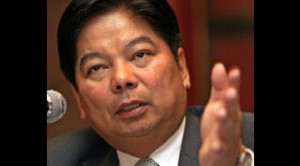BSP hints at further monetary tightening
MANILA, Philippines—Monetary conditions are likely to get tighter in the coming months as the central bank remains mindful of rising consumer prices and excess cash that could destabilize the domestic economy.
The Bangko Sentral ng Pilipinas (BSP) hinted at further moves meant to mop up liquidity from the economy, noting once again that the room to keep interest rates at their current record lows was getting smaller.
“As I have said before, we continue to see inflation staying within our target range over the policy horizon, but given that the full year averages are expected to be slightly above the mid-point of our target range and we have a lower target range for 2015, the room to keep rates steady is narrower,” BSP Governor Amando M. Tetangco Jr. said.
“Clearly, while we see inflation falling within the target range this year and next, there are additional challenges to our operating environment this year relative to last year,” he said.
Last March, the BSP’s Monetary Board ordered local banks to increase the proportion of clients’ deposits that are set aside as reserves. Universal and commercial banks’ reserve requirement was raised by one percentage point to 19 percent. As a result, P60 billion in deposits—as estimated by the BSP—that would have been lent to the public will stay idle in bank vaults.
The Monetary Board’s decision was the first move to tighten monetary settings, aimed at modestly constraining consumer demand to prevent prices from shooting up.
Tetangco said it remained uncertain when supply-side pressures that were caused by typhoon Yolanda last year would dissipate. He said this highlighted the potential risk of so-called “second-round effects.”
“In addition, we continue to be mindful of strong domestic liquidity and credit growth that could heighten financial stability risks,” Tetangco said. “[This] was an important consideration for the preemptive move of raising [the reserve requirement] at our last meeting.”
Benchmark overnight borrowing and lending rates still stand at record lows of 3.5 and 5.5 percent. Inflation, or the average rise of consumer prices across the country, decelerated to 3.9 percent in March after peaking at 4.2 percent in January. Year to date, inflation has averaged 4.1 percent at the end of March.
The BSP expects inflation to average 4.2 percent for the entire year, near the top end of its target of 3 to 5 percent. Next year’s projected average of 3.2 percent is also above the midpoint of the target range of 2 to 4 percent.
American banking giant JP Morgan Chase also sees the BSP raising its key interest rates by 25 basis points in its policy-rate setting next month despite prospects of manageable inflation.
In a research note dated April 4, Singapore-based JP Morgan economist Matt Hildebrandt said inflation was not the main reason why his team was expecting the BSP to raise interest rates. “Rather, financial stability concern—mainly liquidity, negative real interest rates, and currency weakness—appears to be the driver of BSP’s more hawkish tone in recent months,” he said.
The economist noted that after last week’s release of the inflation rate for March, BSP Governor Amando Tetangco Jr.reiterated that the BSP was monitoring domestic liquidity.
Based on the BSP’s more hawkish language, he said monetary authorities were becoming increasingly concerned about financial stability. He likewise noted the shift down in the BSP’s inflation target range to 3 percent plus or minus 2 percent from 4 percent plus or minus 1 percent next year.
“The details of CPI (consumer price index) inflation still look pretty benign, with food being the main driver,” Hildebrandt said. “The softer price pressures outside of food explain why core inflation has eased and is running at much lower rate.”
JP Morgan expects the country’s inflation rate to remain at around 4 percent until mid-year when it is seen to moderate toward 3.5 percent.
“Our annual forecasts now show inflation edging down to 3.7 percent next year from an average 3.8 percent this year,” he said.
